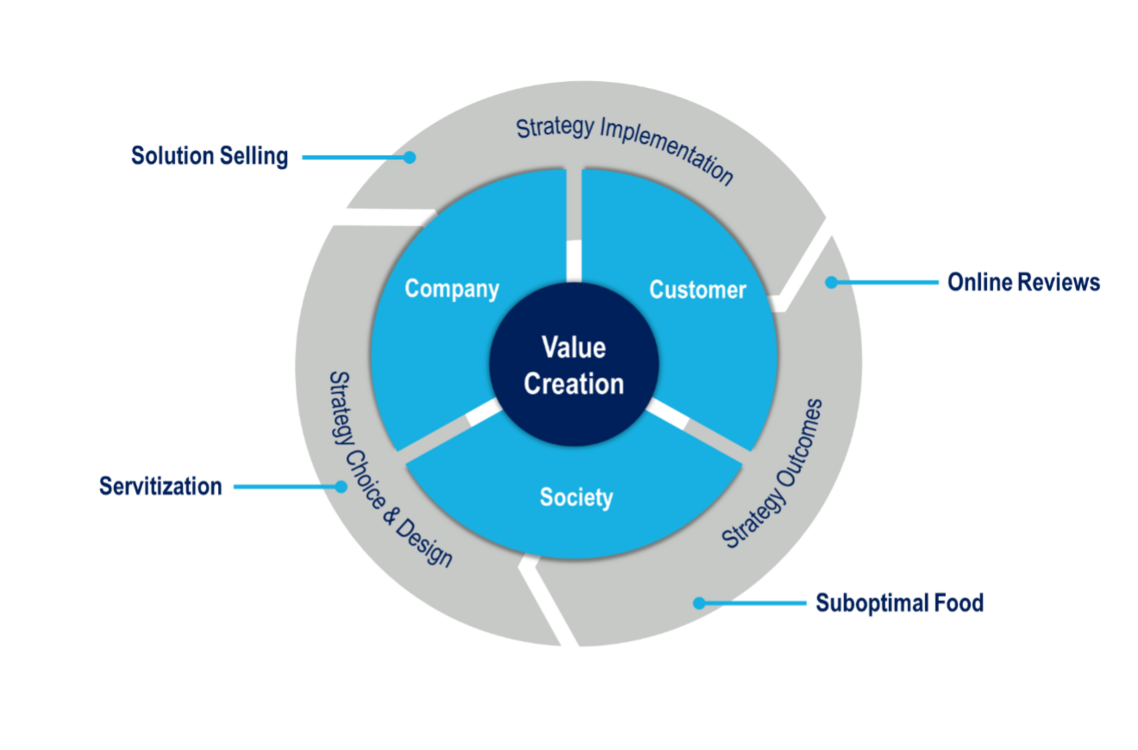Research at the Chair of Marketing and Value Creation
Our research focuses on value-based marketing strategies in which providers proactively assume (co-)responsibility for creating value for customers and society and thus ultimately generate value for the company. We analyse the challenges arising from the increasing value orientation of marketing from various perspectives. Our research projects can be categorised along the strategy development process and each focus on one of the following aspects (see illustration): (1) selection and design of the strategy (company perspective), (2) implementation of the strategy (employee perspective) and (3) consequences of the strategy (customer perspective). Depending on the project, we analyse practical issues in B2B and/or B2C markets. You will find a selection of our research topics at the bottom of this page.
Our research is characterised by a quantitative-empirical orientation. In our research projects we use a broad repertoire of research approaches and quantitative methods (e.g. experiments, structural equation modelling, multilevel modelling, propensity score matching, fsQCA). Our research is also characterised by a strong practical orientation, which is reflected in numerous corporate collaborations. The aim of our research projects is to derive relevant and realisable recommendations for action for companies and consumer institutions. Our strong research orientation is reflected in the fact that our research work has been published in high-ranking international journals and has been honoured with several best paper awards. Finally, our research is characterised by an international orientation. We greatly value the co-operation and exchange with our numerous national and international research partners.

Research topics
Research projects
Here you will find information on our current research projects and a selection of completed projects.
Sponsored by: | German Research Foundation (DFG) |
Applicant: | Prof. Dr. Eva Böhm, |
Project duration: | January 2019 to March 2022 |
Brief description: | We are currently observing an increasing shift in industrial goods companies from product-centred to value-centred business models. By offering comprehensive services and solutions, industrial goods companies want to create additional value for their customers that goes beyond the pure product offering. Companies differ in the implementation and extent of strategic change. Some companies already offer comprehensive operator models and take over entire business processes for their customers. Others, on the other hand, limit themselves to an additional value contribution related to their own product and offer their customers additional services, such as remote maintenance. These changes in companies' business models have often evolved over time. Companies often lack the necessary decision-making tools to systematically plan strategic change. The aim of the research project is therefore to provide companies with support in the question of whether, when and how a change to value-centred business models makes sense. |
Publications of the Chair
- Alavi, S.; Böhm, E.; Habel, J.; Wieseke, J.; Schmitz, C.; Brüggemann, F. (2022), The ambivalent role of monetary sales incentives in service innovation selling [Link], Journal of Product Innovation Management, 39 (3), 445-463.
- Garnefeld, I.; Krah, T.; Böhm, E.; Gremler, D. D. (2021), Online reviews generated through product testing: Can more favourable reviews be enticed with free products? [Link], Journal of the Academy of Marketing Science, 49 (4), 703-722.
- Salonen, A.; Terho, H.; Böhm, E.; Virtanen, A.; Rajala, R. (2021), Engaging a product-focused sales force in solution selling: Interplay of individual- and organisational-level conditions [Link], Journal of the Academy of Marketing Science, 49 (1), 139-163.
- Garnefeld, I.; Eggert, A.; Husemann-Kopetzky, M.; Böhm, E. (2019), Exploring the link between payment schemes and customer fraud [Link], Journal of the Academy of Marketing Science, 47 (4), 595-616.
- Eggert, A.; Hogreve, J.; Ulaga, W.; Münkhoff, E. (2014), Revenue and profit implications of industrial service strategies [Link], Journal of Service Research, 17 (1), 23-39.





